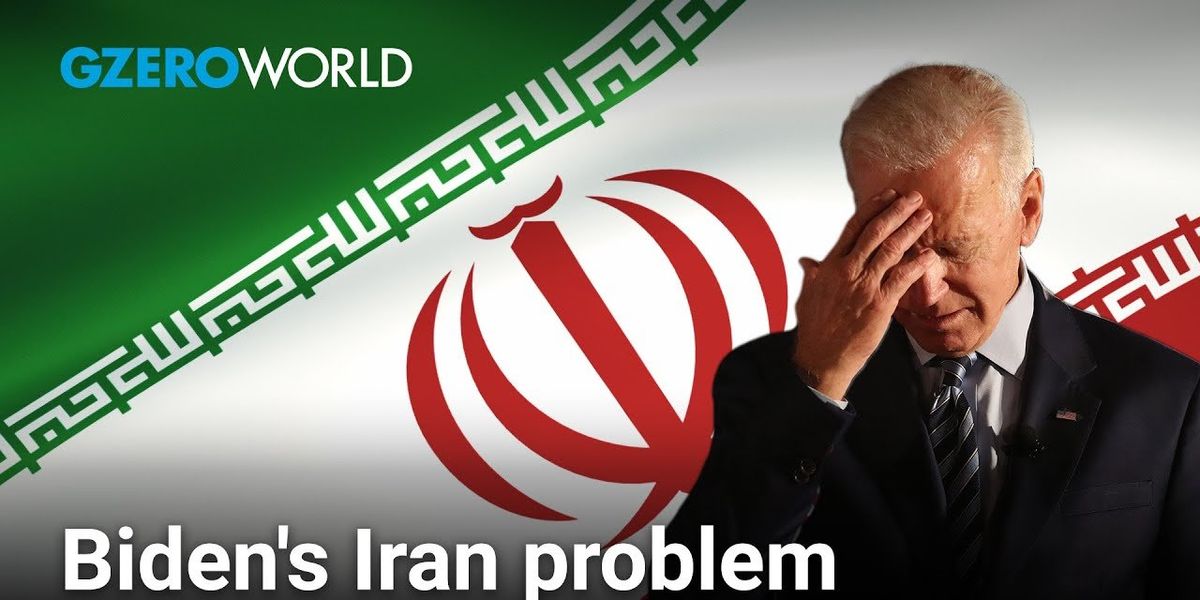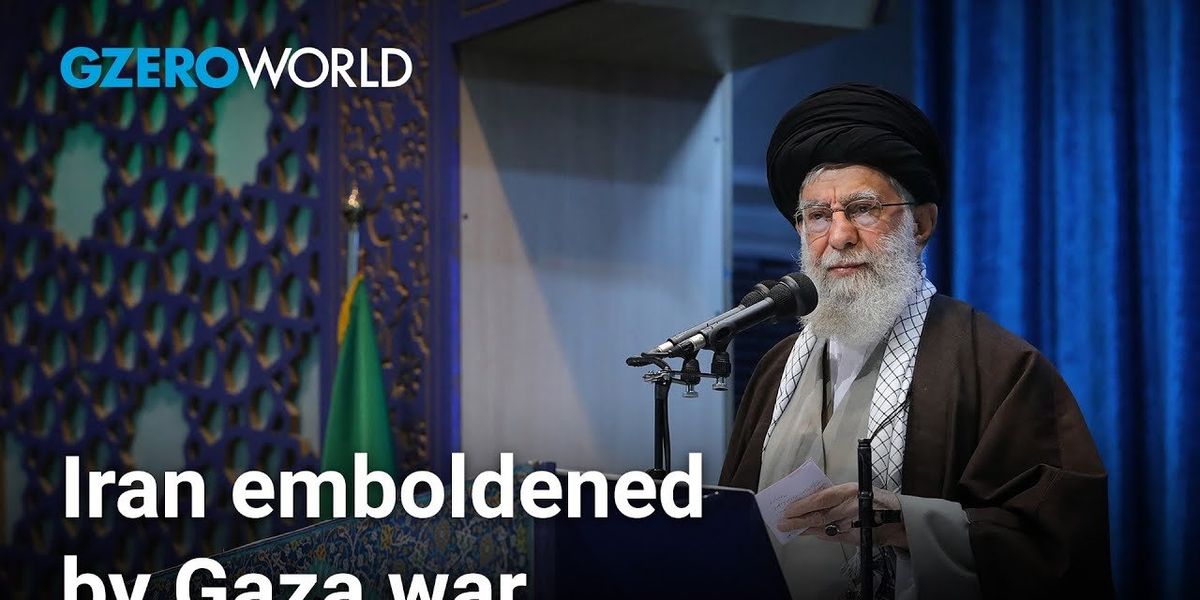Trending Now
We have updated our Privacy Policy and Terms of Use for Eurasia Group and its affiliates, including GZERO Media, to clarify the types of data we collect, how we collect it, how we use data and with whom we share data. By using our website you consent to our Terms and Conditions and Privacy Policy, including the transfer of your personal data to the United States from your country of residence, and our use of cookies described in our Cookie Policy.
{{ subpage.title }}
CISA chief warns of rise of disinformation, election meddling after Nov 5
After January 6, 2021, what once was just a formality became a high-stakes period. Jen Easterly, the nation's top election security official, fears that the real threat to American democracy and stability may come during that crucial period between when votes are cast on Nov 5 and when they're certified, on January 6. "My concern, Ian, is that between November 5th and January 6th—when the Congress is going to certify the vote—our foreign adversaries are going to go hog wild." Easterly, the Director of the Center for Cybersecurity and Infrastructure Security Agency, spoke with Ian Bremmer on GZERO World.
Watch full episode: Top threats to US election security
GZERO World with Ian Bremmer, the award-winning weekly global affairs series, airs nationwide on US public television stations (check local listings).
New digital episodes of GZERO World are released every Monday on YouTube. Don't miss an episode: subscribe to GZERO's YouTube channel and turn on notifications (🔔).
The U.S. 5th Fleet area of operations to help ensure maritime security and stability in the Middle East region.
US interrupts another Houthi drone attack
In the latest example of rising tensions between Iran-backed militias and US forces in the Middle East, a US Navy destroyer on Sunday shot down several Houthi-launched drones that were attacking Israeli commercial ships in the Red Sea.
Houthi rebels, who are backed by Tehran, have taken control over much of Yemen through a brutal decade-old civil war. In October, the Houthis declared support for Hamas in the Gaza conflict, launching several missiles toward Israel — and dropping a slick music video for good measure.
In the weeks after Oct. 7, as the US moved more military assets into the region to discourage Iran from escalating, Tehran-backed militias rapidly increased small-scale attacks against US troops stationed in Iraq and Syria, prompting Washington to respond with airstrikes of its own.
The latest incident underscores the risk that the war in Gaza could flare into a regional conflict pitting Israel and the US against Iran and Iranian proxies such as Hezbollah in Lebanon, various militias based in Iraq and Syria, and the Houthis in Yemen.
Biden team struggles to define clear Iran strategy
Joe Biden may be one of the most experienced foreign policy presidents in recent history, but even he might admit that, at the moment, his administration is lacking a coherent Iran strategy. According to Iran expert at the Carnegie Endowment for Peace, Karim Sadjadpour, the White House's primary aim before October 7th had been to revive the Iran nuclear deal, but that hasn't materialized. Instead, the situation has become more escalatory, which is undesirable for both the US and Iran. Sadjadpour acknowledges that Iran may choose to advance its nuclear program and increase attacks on U.S. forces and Israel if they believe the Biden administration is averse to conflict. And it helps the American popular support for another Mideast war is near zero.
"The challenge that the Biden administration faces is that, on the one hand, they want to avert conflict with Iran, but if you want to deter Iran, you have to make clear to them there's gonna be a cost for that kind of behavior," Sadjadpour told Ian Bremmer on the latest episode of GZERO World.
Watch the full interview: What’s Iran’s next move?
Catch GZERO World with Ian Bremmer every week at gzeromedia.com/gzeroworld or on US public television. Check local listings.
Israel's war in Gaza has emboldened Iran, says Karim Sadjadpour
Since the 1979 Islamic Revolution, Iran's stance towards Israel and its Western allies has been nothing if not consistent, says Iran expert Karim Sadjadpour. In an extensive interview with Ian Bremmer for GZERO World, Sadjadpour emphasizes that Iran has consistently invested substantial resources in supporting militant groups like Hamas, Islamic Jihad, and Hezbollah in an effort to undermine Israel. It's a continuation of Iran's long-term strategy to challenge the existence of Israel.
"Iran wants to defeat the US-led world order, evict the United States from the Middle East, and replace Israel with Palestine. There's perhaps been no government with a more consistent and enduring grand strategy than the Islamic Republic of Iran."
Israel's war with Gaza has only emboldened Iran, Sadjadpour argues. But it's not yet clear whether Iran will be so emboldened as to engage in an overt conflict with Israel or the United States.
Watch the full interview: What’s Iran’s next move?
Catch GZERO World with Ian Bremmer every week at gzeromedia.com/gzeroworld or on US public television. Check local listings.
- What’s Iran’s next move? ›
- Israel at war: How will regional actors respond? ›
- Podcast: Iran's role in the Gaza war: is escalation inevitable? ›
- US braces for Iran-backed blowback ›
- Hamas attacks in Israel ignite war ›
- Iran attacks Israel - GZERO Media ›
- The view from Tehran: Iran's VP Zarif on Israel, Gaza & US complicity in ongoing conflicts - GZERO Media ›
US president Joe Biden
The US and Iran make a deal
By itself, this deal is a significant breakthrough, given the US-Iranian frictions of recent years. But there’s a follow-up question: Is that it? Is this a one-off humanitarian gesture that gives each side something it wants? Or is this the first move in a warming of relations? Cash-strapped Iran wants access to all its frozen assets, and the Biden administration would love to improve relations with its main Middle East antagonist – and to give Iran a reason to cool its relations with Russia.
Could this deal even signal progress toward a return to the Iran nuclear deal? We may know the answer later this month when UN nuclear inspectors issue their latest report on Iran’s uranium enrichment progress.
To deal with Iran's nuclear program, diplomacy is the only safe option: Kelsey Davenport
Iran now says it wants to return to the nuclear negotiating table with the US. For nuclear weapons expert Kelsey Davenport, that's still the best possible option for both sides because it'll put the breaks on the atomic program and give the Iranians some badly needed US economic sanctions relief. Diplomacy, she says, is always the best way because when the US and Israel have tried cyber-espionage and killing Iran's nuclear scientists, it's resulted in the Iranians doing exactly what they're not supposed to under the terms of the 2015 deal. "All options are on the table [and] those options are on the table, but they're not good options." She spoke in an interview with Ian Bremmer on an episode of GZERO World.
Watch the episode: Nuclear weapons: more dangerous than ever?



